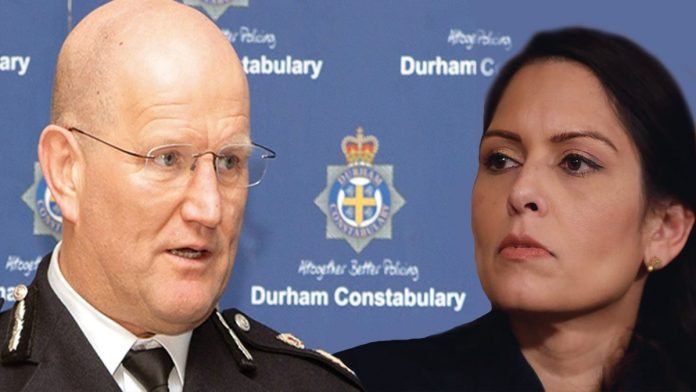
A former police chief has warned that new protest laws move Britain dangerously towards “paramilitary policing” and that UK ministers are “flexing their muscles via their police forces” like repressive regimes around the world.
The warning from Michael Barton, the former chief constable of Durham comes as policing braces itself for a report expected within the next 48 hours after Metropolitan police officers were accused of heavy-handed tactics at a vigil on Clapham Common for Sarah Everard.
Scenes of officers grappling with women led to outrage triggering a U-turn from the Labour Party who were planning to abstain on the Police Crime Sentencing and Courts Bill. the scenes also prompted calls for the resignation of the commissioner, Cressida Dick.
Under pressure, the home secretary has ordered a report expected to arrive early this week from Her Majesty’s Inspectorate of Constabulary. The key question it will answer will be whether the Met’s actions were proportionate or not.
As the new protest laws pass through parliament, Barton and another former senior policing leader, Sir Peter Fahy, told the Guardian they held deep concerns about the dangers the new laws posed for civil liberties already reeling from a year of emergency Covid laws.
The police, crime, sentencing and courts bill, currently passing through parliament, will afford new powers to officers to tackle protests, including measures aimed at static protests and a new offence of “intentionally or recklessly causing public nuisance”, which is in part defined as causing “serious annoyance” or “serious inconvenience”.
Mick Barton, was head of crime operations for policing nationally, and led the Durham constabulary until 2019, which inspectors rated as one of the best performing forces in Britain.
He says: “I’m not in favour of even more restrictive measures. Surely after an historically unprecedented year-long curfew, in peacetime, the government could show some common sense and gratitude for such incredible forbearance to allow civil liberties to once again flourish. Or are they happy to be linked to the repressive regimes currently flexing their muscles via their police forces?
“Fortunately, in the UK we are not a paramilitary-style police force. But these powers dangerously edge in that direction. Police chiefs will be seen as the arbiters of what is and is not allowed when it comes to protest. Democracies thrive on protest. This government has condemned what has happened in the Ukraine but those same protesters would fall foul of our new laws.”
Barton said the move represented a change in the British style of policing by consent, with officers being “citizens in uniform” who are part of their communities and not above them “because police officers are telling people what to do, not negotiating with them”. He added: “I don’t see anything wrong with the current laws. Protests sometimes means people are inconvenienced.”
Police will be able to impose a start and finish time and set noise limits at static protests and apply these rules to a demonstration by just one person.
Fahy, the former chief constable of Greater Manchester police and former vice-chair of the police chiefs’ body, said the proposed protest laws were a mistake and posed a danger for policing.
He said lessons from the past suggested danger, citing the quashing this week of 1970s convictions of trade union activists including the actor Ricky Tomlinson as a warning from history.
“It is short-term and politically driven,” he said. “It is a reaction to what happened with Extinction Rebellion and Black Lives Matter [protests], in the same way Ricky Tomlinson was a reaction to the industrial strife of the 1970s. Policing was drawn into a particular stance and pose.
“It reminds me of the miners’ strike when policing was mobilised for a political reason. It took policing a long time to recover. Policing should be very careful not to be drawn into the situation of being arbiters of which protests can go ahead, and become stuck in the middle. The policing of protest can cause long-term damage.”
Fahy added: “Policing is not always about the majority, sometimes it is about protecting rights of the minority. I’m not sure a mature democracy should have the police deciding which protests should go ahead.”
Their comments came as at least 10 people were arrested on Friday at a “kill the bill” demonstration and a Daily Mirror journalist shared video footage that appeared to show police pushing him and hitting him with a baton as he shouted that he was a member of the press.
A Home Office spokesperson said: “As the home secretary has made clear, the right to protest is a cornerstone of our democracy and the government is absolutely committed to maintaining freedom of expression.
“It is wrong to claim these measures will stop people from carrying out their civic right to protest. People will still be able to protest, but they cannot be permitted to trample on the rights of local businesses and communities.
“These measures will prevent misery to the public and the loss of millions of pounds to the taxpayers and businesses, have been requested by chief constables, including the Met, and are backed by the Independent Policing Inspectorate.”
This is not a Left or Right issue, this is an issue that affects all people of all persuasions. Thomas Paine once said: “He that would make his own liberty secure must guard even his enemy from oppression.” in that light it’s understood ensuring our liberties are not taken from us or restricted in any way is ‘common cause’.
The British people are many things and have many layers of complexities but the one thing that binds us all is our freedoms, those hard fought battles from the Magna Carta of 1215 to the Human Rights Act 1998, were not given they were won.
Freedom of speech and the right to protest peacefully are protected by the law both the common law and the Human Rights Act 1998 cover these fundamental rights.
Common law stipulates our rights: personal security, personal liberty and private property, and auxiliary rights necessary to secure them, such as access to justice. Rights to a fair trial, right to open justice and to freedom of speech are recognised both in the common law and in the Convention of Human rights.
Support Independent Journalism Today
Our unwavering dedication is to provide you with unbiased news, diverse perspectives, and insightful opinions. We're on a mission to ensure that those in positions of power are held accountable for their actions, but we can't do it alone. Labour Heartlands is primarily funded by me, Paul Knaggs, and by the generous contributions of readers like you. Your donations keep us going and help us uphold the principles of independent journalism. Join us in our quest for truth, transparency, and accountability – donate today and be a part of our mission!
Like everyone else, we're facing challenges, and we need your help to stay online and continue providing crucial journalism. Every contribution, no matter how small, goes a long way in helping us thrive. By becoming one of our donors, you become a vital part of our mission to uncover the truth and uphold the values of democracy.
While we maintain our independence from political affiliations, we stand united against corruption, injustice, and the erosion of free speech, truth, and democracy. We believe in the power of accurate information in a democracy, and we consider facts non-negotiable.
Your support, no matter the amount, can make a significant impact. Together, we can make a difference and continue our journey toward a more informed and just society.
Thank you for supporting Labour Heartlands











